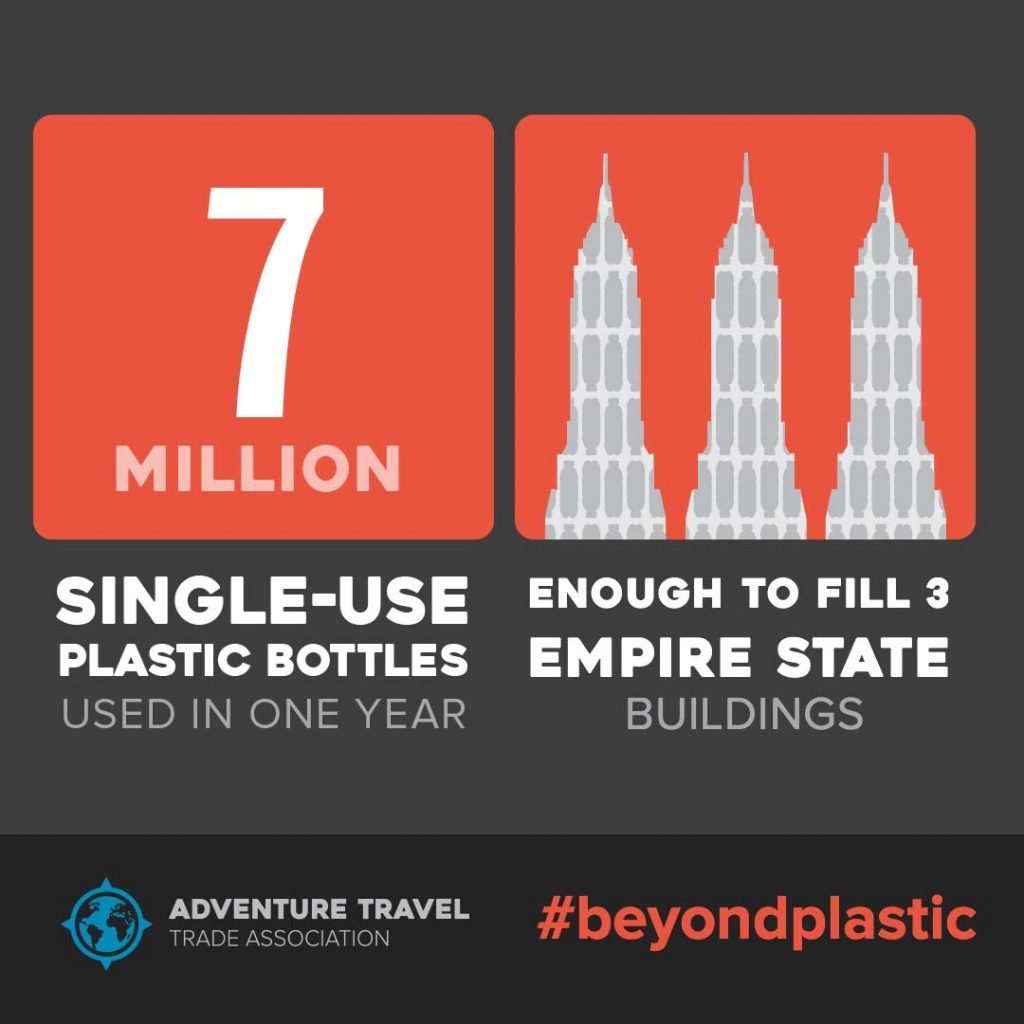When the Adventure Travel Trade Association (ATTA) committed to curbing the use of single-use plastic bottles as one of its strategic initiatives in 2018, we knew plastic usage was an overwhelming global problem. Such a big problem, in fact, outdoor and travel brands like Timberland and Marriott as well as a number of destinations have implemented their own initiatives to eliminate, reduce, or reuse plastic.
To fully grasp the enormity of the situation, however, the ATTA and Travelers Against Plastic (TAP) teamed up to create and distribute a survey to the ATTA and TAP's database of adventure tourism businesses getting to the root of the single-use plastic bottle issue: How often are single-use plastics used in their operations? What successes and challenges have they faced in reducing single-use plastic waste? In what areas could the ATTA support their efforts? The information respondents shared will ultimately guide the ATTA’s efforts in helping the travel trade community (and its customers) reduce the use of single-use plastic water bottles in tourism.

More than 500 people (most of them tour operators) sending guests all around the world participated in the survey. The vast majority of them (92 percent) are extremely concerned with the environmental impacts of single-use plastic bottles, and 80 percent believe they have a strong understanding of the plastic waste issue. Further, 58 percent have a published sustainability code of ethics.
Despite this, the use of single-use plastic bottles remains prevalent in the adventure travel industry. In fact, 60 percent of survey respondents reported their businesses use single-use plastic water bottles on all or some trips, averaging two bottles per guest per day. Considering only the 239 survey respondents who stated they use plastic water bottles in their business operations, this results in an estimated use of 6.8 million single-use plastic water bottles annually, which weigh approximately 77 tons. Most of these end up in landfills, destroying the land and polluting the oceans, as only nine percent of the world’s plastic is recycled.
Though the environmental consequences of relying on single-use plastic bottles are devastating, using them also comes at an extraordinary business expense. Survey respondents estimate their expenditure on single-use plastic water bottles averages $2.33 USD per guest per day. This means the average adventure tour operator spends a whopping $33,272 annually.
Realizing the environmental and financial costs of using single-use plastic bottles, an increasing number of adventure travel companies are beginning to take steps toward reducing their use, such as by advising or requesting clients to bring reusable water bottles on their trips (28 percent), providing water to refill bottles (26 percent), giving reusable bottles to clients (18 percent), and educating clients pre-trip on the plastics issue (16 percent). Nonetheless, challenges remain: Guests express concern about the quality of self-filtered water or demand single-use plastic water bottles, destinations do not always lend themselves to safe or clean drinking water, and there is a significant cost in providing alternatives to single-use plastic water bottles.
To address these challenges, the survey included an open-ended question about what the ATTA can do to help support businesses’ efforts in curbing single-use plastic water bottles. The top five areas identified include the need for educational materials for travelers, educational materials for the travel trade, continued advocacy and promotional campaigns to raise awareness about the issue and alternatives, identification of and access to viable alternatives, and suggestions and/or implementation strategies to help secure partner and peer buy-in.
To the survey respondents and the adventure travel trade community: We hear you, and we are formulating a plan, based on survey respondents’ feedback, to help support the travel trade curb the use of single-use plastic water bottles. The ATTA is already active in tending to the issue, including partnering with TAP to help businesses learn more about the issue and partnering with Grayl to provide an alternative to adventure businesses. Additional action plans will be revealed in the months ahead.
In the meantime, please download the comprehensive survey findings and infographic, and stay in touch with questions, concerns, or thoughts related to the ATTA’s single-use plastic bottle initiative at [email protected].

